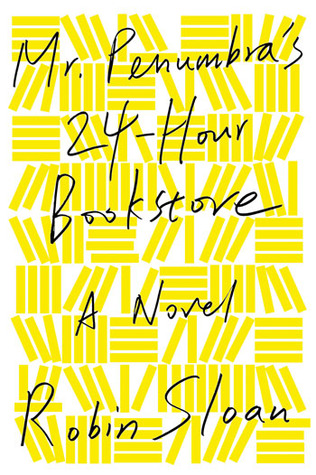
A book about a bookstore… As a librarian, I could not pass it by.
Imagine yourself entering a bookstore which is hopefully not a very rare occurrence. This is not just any store but one that makes you think: “the shelves were packed close together, and it felt like I was standing at the border of a forest – not a friendly Californian forest, either, but an old Transylvanian forest, a forest full of wolves and witches and dagger-wielding bandits all waiting just beyond moonlight’s reach. There were ladders that clung to the shelves and rolled from side to side. Usually those seem charming, but here, stretching up into the gloom, they were ominous. They whispered rumors of accidents in the dark.”
Clay Jannon, a laid off web designer, ends up on the threshold of such a store while searching for a job. At this point any job will do. Being quite an avid reader (using Kindle, of course), he agrees to be a night clerk at a bookstore. The store does not have a lot of customers. Those that do appear at the break of dawn are rather peculiar, to put it lightly. Their visits are recorded in detail, including the mood of the customer and even the material his buttons are made of.
When an IT guy has his trusty Mac and a lot of time in his hands, all kinds of ideas start wandering around in his head. Clay is no exception. Especially once the store owner told him not to look into the books at the back shelves. But of course Clay takes a look and discovers rows of symbols of a code. And thus the mystery of wild proportions begins to unveil.
The coded books lead to a secret society that is searching for the source of immortality. Clay and his friends could not help but be drawn to the search. Who in their right mind wouldn’t be? They gather together a perfect group for a heroic quest: a rogue (Clay himself), a wizard (a girl from Google who has thousands of computers at her fingertips) and a warrior (Neel Chah, CEO of a web design company, who provides the financial and technological backing). There are many more intriguing characters. For example there’s a master of cinematic special effects who still uses glue in his creations. Thrown in the mix are Google Project team members and black-cloaked figures who have been trying to crack the code for the last five hundred years.
This is a debut novel by Robin Sloan and being ingeniously funny, is written mostly for entertainment. It also has a rather realistic feel to it because of the technology used to accomplish ‘the quest’ more or less exists in real life. But only the so-called googlers know what really happens in their offices and we are not privileged to that information. The main theme of the book is the never ending conflict of old vs. new, traditionalism vs. innovation, published books vs. digital ones. The author joins the publishing press and the book robot scanner under one book cover and they feel rather comfortable together. As do the representatives of old and new generations. The reason is that they are all booklovers, no matter their age or background.
Despite the tone of the novel being humorous and even childish at times, some philosophical questions do appear between the lines. Said questions are not presented in code, but they do not jump at you either. We are presented with questions like these: Why would anyone want to reach immortality? Can an author reach immortality through his work? What is the future of the published book? Does it even have one? And last, but not least: how much will we be depending on computer technology in the future? Will it all collapse and force us to return to the way we lived before computers? One can never know.
On his website Robin Sloan calls himself a ‘media inventor’ – someone who creates styles and formats, because he is not satisfied with the limits of the existing ones. The same can be said about the message of the book: create and use your imagination because there are no limits to a creative mind. And if several of them come together then anything is possible, no matter how crazy it may sound.
***
London: Atlantic Books, 2012
Check from the e-catalogue ESTER
Olga Ivaškevitš
Väike-Õismäe branch library

